(click on picture to open file)
By: Michael D. Vogel
© February 1996. Michael D. Vogel. All Rights Reserved.
Published in:
Virtually Alternative magazine – February 1996
Free Gotham – January 5, 2011
As a Los Angeles-based quartet, 311 have covered a lot of territory since their inception. With music influences that range from Sly and the Family Stone to Bob Marley, this Omaha-born band mixes hard-rock, funk, rap and reggae into a very potent music cocktail. Since the release of their debut, Music, in 1993, the band has released an album per year while supporting a nonstop touring schedule – selling out clubs and theaters nationwide, thanks mostly to their massive grassroots fan base. As the band prepared to embark on a national tour with Cypress Hill and The Pharcyde, Nick Hexum, Chad Sexton and Tim Mahoney invited me to their Laurel Canyon home to discuss life, music and the world of 311. Blending their razor-sharp wit and diverse musical knowledge with an aggressive attitude, the band has taken a rare musical ideology – the music path of positive outlook.
Where did the name 311 come from? What does it mean?
Nicholas Hexum, Tim Mahoney & Chad Sexton: “We have a lot of different meanings for 311. It could just be the time of the day. You see it on your clock and you think of our music, and it just so happens to be the police code for indecent exposure. Basically, it doesn’t tell you anything about us because we aren’t any one specific thing. The meaning is different and unique for each person who listens to our music.”
How did you guys meet and come together as a band?
NH: “We went to high school together in Omaha. Tim and I were in a band outside of school and Chad was part of the school jazz band. That’s how we all came together, but we didn’t start playing together as a band until after we graduated in 1988. That’s when our music started.”
Coming from such varied backgrounds, what kind of musical direction did you discuss when forming the band? Was there a specific sound that you wanted to achieve?
NH: “When we first started playing together, we were all really excited about playing the funk. We really didn’t pick any specific destination. Tim and I had been part of a loud alternative band that wasn’t funky, and then we met Chad and everything changed. That was where we had common interests. Chad and I were really into Prince and that kind of funky stuff. Two years later it evolved a little more with the additions of P-Nut and SA to the lineup. At that time, we started over, calling ourselves the 311, even though we still played some of the songs from the original band, Unity, back in 88 and 89.”
Is there a significant difference in the momentum of the band after three albums?
Nick and Chad Sexton: “The fan base has continually grown stronger, but at a comfortable rate for the band to deal with. It just grows from one person to the next. We feel that is the way to do it. If the buzz on the band spreads by word of mouth, you can get deeper roots, rather than if you get well known by a radio hit. We have tours to go on, which ultimately helps pay the bills.”
Do you feel that the progress the band is making is similar to that of, say, the Grateful Dead?
Nick and Tim Mahoney: “We hope top be like that. They are a role model as far as communicating directly with their fans, and encouraging that connection to such an extreme that the fans love the band so much. They are musically cool, but what’s really revolutionary about them is they approach music as a whole – as a new level of communication, including all the decisions they make around it as far s how they go about touring. That’s really the ultimate of what a band could potentially achieve. Maybe there will be a band that will eventually take it one step further, but at this point the shear magnitude of what they had going on around their touring – people traveled around the country, living for the band. The Grateful Dead truly transcend what other bands are trying to do.”
The band is somewhat of a musical cocktail. Where did the quasi-funk/Rap/Rock/Reggae style come from?
NH, CS & TM: “Our influences range from Nat King Cole to Bad Brains to Prince. Everyone has their favorites. We all like good bands like Alice IN Chains and Bad Brains, but we each have our own things that no one else is into but us. For example, I’ve been getting into English dance music, techno and trip-hop. Chad listens to a lot of Jazz and Tim listens to the great guitarists. There are a multitude of ingredients in our musical stew.”
What other kinds of music were you exposed to growing up?
NH, CS & TM: “The Smiths were important from a vocal stand point. Morrissey was really melodic; he has a great sounding voice. We were all part of cover bands that played the Smiths, R.E.M. and music from the alternative-rock scene of the late 80’s. U2 has been the killer band that continues to reinvent themselves. R.E.M. was able to establish them selves not through radio-made hits but through constant touring and College Radio. This is really promotion more by word of mouth than anything else. They stayed true to themselves and their unique sound, and then the rest of the world figured out that what they were doing was cool. When you bite off such a big piece to create your own sound, it takes longer for people to come around and open up to what you’ve been creating. Ultimately, it is more rewarding in the long run because the fans tend to appreciate you more. That is why we try to stay away from the norm and deliberately not make things really easy on ourselves. It is a lot more interesting to be an innovator than to just be rich.”
When creating and writing an album, how important is it to consider potential radio airplay? Does it affect the way you write and record songs?
NH, CS & TM: “We consider what out own tastes are and what our hard-core fans will listen to. If you can’t get people to listen to your music when you’re doing what you, as a band, like, let alone what is commercially acceptable, then the situation becomes hopeless. So we just try to stay true to ourselves. At our shows, and for people who are into our music, it’s really the more the merrier. There is no ‘type’ of person that we would turn away. We are definitely not trying to be the high-browed elitists! We get fan letters all the time stating that we’re really cool now, but soon people will catch on and all the trendy wanna-bes are going to start listening to the music and coming to our shows. To us, there should be no elitism. Everyone has the same set of emotions and thoughts going through their heads – so anybody can come and be involved.”
Currently, you are on tour with Cypress Hill and The Pharcyde. How is the audience vibe different at one of these shows, alternative rap, as opposed to an alternative-rock show – such as the tour with No Doubt and 1,000 Mona Lisa’s?
NH: “We like to tour with bands that have a similar audience. We like the audience to be filled with positive, open-minded people. We have a tendency to tour with other bands, like ourselves, that are cross-genre. For example, Cypress Hill has taken rap to a totally different audience. KoRn is another example of a hard-rock band with hip-hop influences. Dag is a 70s funk band that we also like to tour with. The Phunk Junkees are another innovative band that has a similar appeal. Our current tour is the most hip-hop-oriented one we’ve been a part of. We do similar sets for the various audiences and other artists who we perform with. We’re not going to pick different songs or change the arrangements. The set will still be a musical cocktail of hard-rock and rap.”
CS & TM: “No Doubt and Cypress Hill are two bands that would never tour together, but they both fit with us. 311 bridge the gap between the alternative hard-rock and rap scenes, which are the two different musical spectrums that these bands represent.”
Your tour bus caught fire while you were on the road a few years ago. Reflecting back, this moment must have been your worst tour experience.
CS: “That was absolutely the worst thing that has ever happened to us. We lost everything; all our instruments and clothing and the rest of our material possessions up in flames. The flames alone coming off the bus were at least 70 feet high. The smoke column was rising up like a volcano. It was as if it were a staged stunt straight out of a Clint Eastwood movie. We have never seen anything like it. We had just fueled up; 60 gallons of gas in the tank igniting like a raging inferno. It was just a huge mass of flame and smoke. Obviously, that night’s show was cancelled because we had no equipment. We then borrowed instruments for the following night and continued with that leg of the tour.”
You guys are always on the road and touring. And yet, in just under four years, you have released three albums. When do you find the time to write new material?
NH: “The past month is the first time that we actually took some time off. We are usually working all the time. Usually, it’s time to write, or it’s time to record, or it’s time to go out on the road. This is our regular routine. Each of the last three years we have recorded an album and have had a tour of at least 100 shows. That’s a lot of time. There is some occasional writing on the road, consisting of writing down a riff, lyric or idea and then trying to capture that idea on tape to keep the idea fresh in our minds. Although, sometimes we will just write in out. We also make stuff up here and there in our spare time. Usually, before we travel though, we have a writing period where we do our homework and write new material.”
There is a good buzz on “All Mixed Up,” coming off the heels of “Don’t Stay Home,” with the video channels and radio supporting the songs. Does this sudden rush change how the band perceives its own success?
NH, CS & TM: “We feel that we are still an underground band. We hear about our success, but we don’t really feel any of the effects. It has always been a one-step-at-a-time pace. This has always been a pretty face, always exciting. There has never been a lull in the action. Overall, we don’t really focus on that. We’re more interested in putting out quality music. Our biggest concern is putting on a great live show so that we can blow people’s minds. By ding so, we hope that people will spread the word about the music of 311. The impact from videos, we feel, has never been enough. Fans have told us that they have caught our videos, but never so many people that it made a great impact. That will be a whole new experience, when the video world starts to affect us. We have hit our stride performing live, but as far as the video world, we’re not that comfortable yet. We like to stay with our roots – and that’s performing live and recording good quality music.”
Your albums are always issued in two different versions, one safe for radio and in-store play, and the other for the consumer. How do you feel about censorship? Does it affect the way you create a song?
NH, CS & TM: “The fee world should decide an issue like censorship. Radio’s mission should be to push the envelope of what our society can tolerate and deem acceptable. We help contribute to that philosophy with songs like ‘Home Brew’, which has offensive lyrics throughout. We do not change the way we approach a song simply because it may be questionable to the mass populous. Music is supposed to make you think, to get a reaction out of the listener. If it doesn’t, then what is the purpose of it? There is something seriously wrong with our society when you can watch a war live on television, people being rape and killed in front of a live captive audience, yet you can’t use questionable language in music or our daily conversations.”
How has the influence of a super-producer like Ron Saint Germain (Soundgarden, Living Colour) affected the band?
NH, CS & TM: “He is a very energetic and crazy guy who knows his music, technically. He is familiar with as many different styles of music as we are. He knows about everything from reggae to jazz, from punk to classical. His input would be more of a technical nature. He would give us direction the same way our manager and soundman do. Later on, after hearing the differences, we would realize he was right. He is very positive, always offering constructive criticism. Technically, Ron is state of the art and at the same time very educational. He brought six racks of electronic equipment into the studio for us to use. The end result is a very sophisticated 311 album.” ^m^
Line-Up: Origin:
Nicholas Hexum – Vocals & Rhythm Guitar Omaha raised, Los Angeles based
SA Martinez – Vocals & Turntables
Timothy J. Mahoney – Guitar
P-Nut – Bass Website:
Chad Sexton – Drums & Percussion www.311.com
About The Current CD:
This eponymous effort is the band’s sixth release, and third for on Capricorn Records.
Discography:
311 (Capricorn, 1995) Hydroponic (self-released, 1992)
Grassroots (Capricorn, 1994) Unity (self-released, 1991)
Music (Capricorn, 1993) Dammit! (self-released, 1990)
Produced By:
Ron Saint Germain & 311
Label:
Capricorn
© February 1996. Michael D. Vogel. All Rights Reserved. This originally appeared on the Vogelism blog at https://www.vogelism.com, authored by Michael D. Vogel. This article may be shared or reprinted as long as this entire copyright message, including the source location of this article, accompanies it.







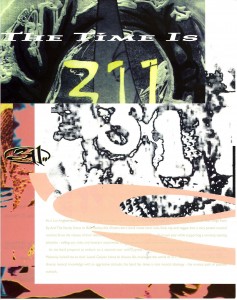
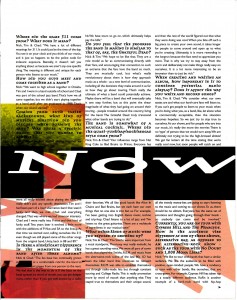
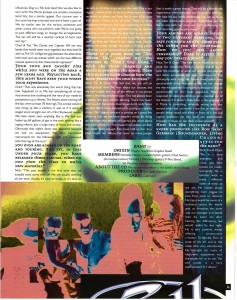

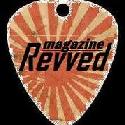
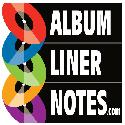


 Welcome to Michael D. Vogel’s online portfolio. I am a Los Angeles-based music journalist/content creator, and self-professed music-fanatic/radio-aholic. With more than 20 years of experience in multiple facets of the music industry including; music programming/air talent for terrestrial and internet radio as well as record label artist promotion, I have a finger on the pulse of what's new and under the radar in the emerging music scene. Areas of specific expertise include, but not limited to: rock (heritage, mainstream, heavy metal/hard rock and alternative), pop and adult contemporary, as well as radio, pop culture, sports, exercise and politics. I am applying my passion for music as a freelance writer for the Examiner as National Music Examiner (Examiner.com) in addition to West Coast Editor for FreeGotham (FreeGotham.com). Find me at michael@vogelism.com.
Welcome to Michael D. Vogel’s online portfolio. I am a Los Angeles-based music journalist/content creator, and self-professed music-fanatic/radio-aholic. With more than 20 years of experience in multiple facets of the music industry including; music programming/air talent for terrestrial and internet radio as well as record label artist promotion, I have a finger on the pulse of what's new and under the radar in the emerging music scene. Areas of specific expertise include, but not limited to: rock (heritage, mainstream, heavy metal/hard rock and alternative), pop and adult contemporary, as well as radio, pop culture, sports, exercise and politics. I am applying my passion for music as a freelance writer for the Examiner as National Music Examiner (Examiner.com) in addition to West Coast Editor for FreeGotham (FreeGotham.com). Find me at michael@vogelism.com. 